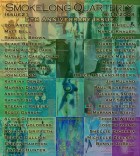You are obviously not a middle-aged man, Bonnie, but what makes “Real Estate” such an effective story is how convincing a character Tony is. From where did he come? How do you inhabit the characters you write?
I’m glad Tony comes across as convincing. I try as hard as I can to simply be the main character, no matter who it is or what he or she is doing. Even if I’m not like this character at all, don’t have a life like anything like his, or would never do what he does, I try to imagine what I would do or feel if I were him and how I would rationalize what I was doing. In my particular case, it doesn’t help to try to analyze why I’ve written from a particular point of view. I just go with it. If I thought about it too much, I don’t think it would come out right.
I’m really taken by how sweet this story is, and the ending especially is so gentle and humane. Is sweetness a harder truth to tell than despair?
I think it might be. Contemporary readers don’t buy that old happily-ever-after stuff, couples leaping across fields to finally embrace, cowboys riding righteously off into the sunset. I’m an avid reader, too, and those kinds of endings are pretty saccharine and unrealistic. And they’re too easy.
Once in a while I have a jag of stories that have endings that are too happy, and I realize I have to go back and muddy the waters or no one will really be happy about it, only put off or nauseated. Or sometimes if you’re very subtle, you can have a happy ending, especially if a reader isn’t quite sure whether it’s happy or not.
Tony asks himself a lot of questions in “Real Estate,” about himself, his life, the mistakes he may have made with his family. Seems to me, these questions are the heart of the story, its central tension, its source of emotion, which are played out in his encounter with Mrs. Seeger. Does that sound right? Does Mrs. Seeger answer any of these questions for Tony?
Tony is asking himself a lot of questions right now because over the last year his life has crashed—his children are now out of his life, though he never wanted that. Did he do something to encourage this? He still loves his wife, and yet somehow he must not have conveyed that to her, or she doesn’t care. He doesn’t ever want this to happen again, so his choice is to either sit in his corduroy chair inside his new Airstream and stew for the rest of his life, or to make himself answer these questions to prevent himself from ever being in this situation again.
He never asks Mrs. Seeger anything directly; it’s he himself who must dig for answers. But in a sense she is an answer. She’s open and someone who still wants to play the game of love and life. She’s still willing to wear perfume and feminine dresses and has the energy to be concerned about Tony, while his ex, Lydia, has had enough and seems only able to be caustic. I don’t think she and the man she’s running off to Alaska with (if there really is one) stand much of a chance. I imagine her sitting around in sweats with holes in the knees criticizing anyone who cares about anything. She’s in worse shape than Tony. He’s inspired enough by Mrs. Seeger to open a door for her, to be gentlemanly about her tinkling, to try.
Is there a dark side to Mrs. Seeger? How would you write her story? Would you like to give us the first line of that story?
I’m pretty convinced there’s a dark side in all beings, but I don’t see anything out of the norm for Mrs. Seeger. I do think she’s probably had a plan since she first met Tony, and she’s gotten what she wanted. He’s someone who needs and wants her, as opposed to her deceased husband, who probably didn’t appreciate her. But I don’t see anything wrong with a person knowing and getting what she wants.
“She could see he was a handsome rake, at least he had been. Not that she’d say a word about it. No, she had a job to do today, an important job—finding a comfortable place for someone as uncomfortable as Tony to live.”
This issue marks SmokeLong‘s fifth anniversary, which has the staff thinking a lot about longevity and growth. There’s no denying the literary arena is fickle, with journals coming and going, writers shooting onto the scene then falling into a long hiatus, editors changing houses, agents merging, trends in what’s hot, what’s not. How do you, as a writer, endure the ups and downs? Have you experienced any setbacks? What measures have you taken to grow?
The longer I write, the more I understand I’m writing for myself, not the market. I worked at Cosmopolitan where Helen Gurley Brown called me a mouseburger (as she described herself) when I had my heart broken. I’ve moved from the West Coast to the East Coast and back again, poor enough to label all my personal belongings as “Books” so I could have them with me. A fork finally fell out of the last box I shipped, and the postman told me he’d be watching. I had a husband die of AIDS after fifteen years of marriage. I’ve been rejected so many times that anybody in her right mind would have quit and become a dentist. I’ve stopped writing for periods of time for all of these reasons, but then I always start writing again because I seem to have to. I grow by trying to push myself to experiment with writing and then deciding what I do and don’t like. Sure, I like being published as much as the next writer, mainly because I want people to read what I’ve written. A story is meant to be told to a reader.



 The core workshop of SmokeLong Fitness is all in writing, so you can take part from anywhere at anytime. We are excited about creating a supportive, consistent and structured environment for flash writers to work on their craft in a community. We are thrilled and proud to say that our workshop participants have won, placed, or been listed in every major flash competition. Community works.
The core workshop of SmokeLong Fitness is all in writing, so you can take part from anywhere at anytime. We are excited about creating a supportive, consistent and structured environment for flash writers to work on their craft in a community. We are thrilled and proud to say that our workshop participants have won, placed, or been listed in every major flash competition. Community works.